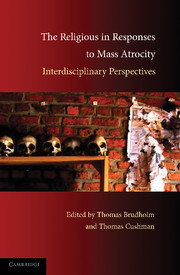Book contents
- Frontmatter
- Contents
- List of Contributors
- Acknowledgments
- Introduction: The Religious in Responses to Mass Atrocity
- Part I Between Necessity and Impossibility: The Role of Religion in the Face of Atrocity
- Part II Does It Help to Import Religious Ideas: Reflections on Punishment, War, and Forgiveness
- 4 Can We Punish the Perpetrators of Atrocities?
- 5 The Ethics of Forgiveness and the Doctrine of Just War: A Religious View of Righting Atrocious Wrongs
- 6 On the Advocacy of Forgiveness after Mass Atrocities
- Part III Sociologies of the Religious in Responses to Mass Atrocities
- Index
6 - On the Advocacy of Forgiveness after Mass Atrocities
Published online by Cambridge University Press: 01 September 2009
- Frontmatter
- Contents
- List of Contributors
- Acknowledgments
- Introduction: The Religious in Responses to Mass Atrocity
- Part I Between Necessity and Impossibility: The Role of Religion in the Face of Atrocity
- Part II Does It Help to Import Religious Ideas: Reflections on Punishment, War, and Forgiveness
- 4 Can We Punish the Perpetrators of Atrocities?
- 5 The Ethics of Forgiveness and the Doctrine of Just War: A Religious View of Righting Atrocious Wrongs
- 6 On the Advocacy of Forgiveness after Mass Atrocities
- Part III Sociologies of the Religious in Responses to Mass Atrocities
- Index
Summary
Forgiveness is pitiless. It forgets the victim. It negates the right of the victim to his own life. […] It cultivates sensitiveness toward the murderer at the price of insensitiveness toward the victim […] The face of forgiveness is mild, but how stony to the slaughtered.
Cynthia Ozick (1998).There is an imprudent manner of recommending forgiveness to us that rather is a means for making us disgusted with it.
Vladimir Jankélévitch (2005).In August 2007, an Iraqi delegation visited Denmark and a hearing was held in the Danish Parliament. The topic was the role of religion in relation to reconciliation in Iraq and the delegation was led by the Anglican vicar Andrew White who has for some years been involved in peace-work in Iraq and the Middle East. The hearing was plagued by the usual problems of simultaneous translation and minds, or maybe just mine, started to drift. Yet, near the end, a member of the audience asked the panel to elaborate their perspectives on Desmond Tutu's famous statement that, as one speaker put it, “there can be no future without reconciliation.” Of course, what Tutu has written and proclaimed on numerous occasions is something different and more controversial, namely that there can be no future without forgiveness (Tutu, 1999). What was interesting to me was not the misquotation as such, but the fact that the topic of forgiveness had not been mentioned a single time during the hearing – not even by the vicar, who otherwise jested and spoke in ways reminiscent of the charismatic performances of his much more well-known Anglican fellow. […]
- Type
- Chapter
- Information
- The Religious in Responses to Mass AtrocityInterdisciplinary Perspectives, pp. 124 - 154Publisher: Cambridge University PressPrint publication year: 2009
- 5
- Cited by

